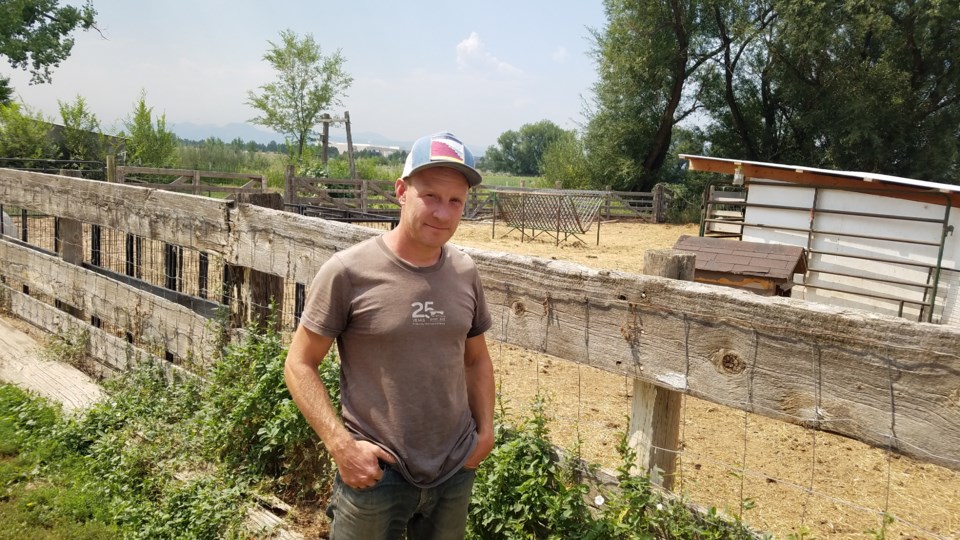Longmont farmer Craig Scariot is a patient man. He gave up eating meat for 15 years because he did not like that most conventional farms and ranches kept livestock in pens and locked away from natural, green pasture.
Scariot started SkyPilot Farm just off Airport Road in Longmont with co-owner Chloe Johnson six years ago, and slowly began piecing together an operation of grass-fed lamb, pork and fresh eggs. The farm’s products are largely sold through an online store and at local farmers markets.
But even the easy-going Scariot’s patience is being taxed by having to spend hours on the road to get his meat processed for sale because of a shortage of U.S. Department of Agriculture-inspected meat processing plants in the state. The problem got worse in the spring when outbreaks of COVID-19 led to the intermittent shuttering of meat processing plants across the country, including Greeleys’ JBS plant, creating a huge backlog for farmers who needed to get their meat to market.
The shutdowns led to panic buying in many grocery stores when shoppers suddenly saw shelves empty of meat, eggs and produce, Scariot said.
“I think it really opened the eyes of a lot of people that there are very few, centralized places that process their meat,” Scariot said. “They saw that very few companies have a tight grip on our nation’s food supply.”
Scariot is keeping his eye on a proposal from Boulder County to amend land use code to allow farms and ranches to slaughter, dress, process and package meat and poultry on-site.
The changes are aimed at promoting a diverse and sustainable agricultural economy in the county, said Dale Case, director of the county’s Land Use Department. The county’s review of zoning related to farming showed changes needed to be made to mirror shifts in local agriculture operations.
“The restrictions on processing were identified by several farmers as a barrier to establishing a sustainable local food economy,” Case said. “The code did not recognize the small scale processing these farmers need and lumped the use in with some of the more intensive operations.
“The amendment is a reasonably discreet change to the code, which can help local farmers meet the intent of the code and the direction of the county commissioners,” Case said.
The county is still researching and drafting the proposed amendment and it should reach the county Planning Commission for consideration in October, Case said.
The USDA in a July 22 report stated it wants to adapt to the increasing demands of consumers to buy their meat closer to home.
“The current pandemic has also created a resurgence in demand for services provided by the small and very small processors, and for consumers who are interested in buying their meat more directly from the farm and ranch where it was raised,” the USDA stated. “USDA is committed to working with stakeholders to balance food safety with these growing consumer preferences and growing e-commerce platforms.”
The closest plant Scariot can take his livestock is Innovative Foods in Evans. But a fire there in April closed the plant. It has since reopened but the shutdown created a backlog for farmers and ranchers hoping to get their products processed, Scariot said.
“It takes up three to five months to process our meat after the fire,” Scariot said. “They are not taking appointments for most of our livestock until 2021 and they won’t take beef until 2022.
“But this has been a problem since we started and it’s a complicated problem,” he said. “But I think it got worse under COVID-19.”
After the fire, Scariot had to drive to Fowler and Craig for processing, trips that took more than eight hours on the road.
“Riding all that way with the animals all crammed in together, just kind of defeats the purpose of what we do here,” Scariot said.
Sheep and hogs graze the alfalfa fields on the 50 acres surrounding the farmhouse. The operation includes roughly 600 or so acres in Boulder and Weld counties, Scariot said.
His and other small-scale farms would benefit by having a USDA-inspected processing center in Boulder County. But that would likely come with more regulations and other complications.
He said he needs to know more details about the county amendment to understand if it will help him.
“This is a very layered issue,” Scariot said. “I don’t think just one thing will solve it.”



